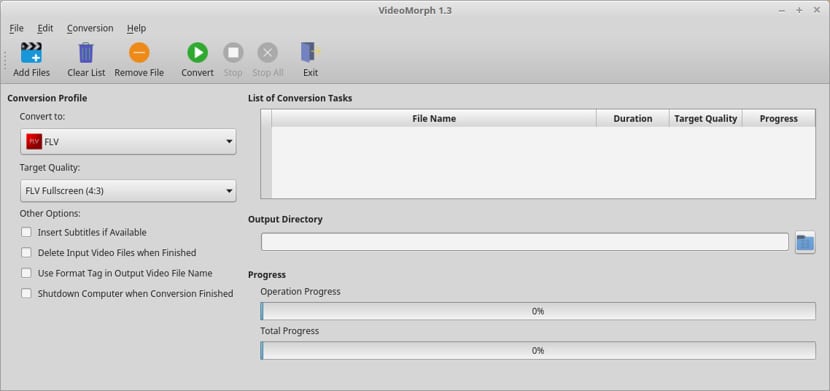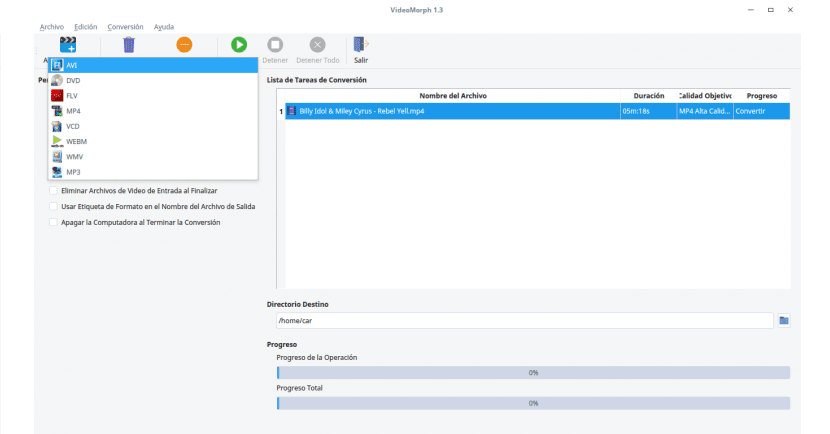
Si are looking for an application to be able to convert their multimedia files in a simple way and without having to resort to configurations and add parameters, today we are going to talk about an excellent application.
The application that we will talk about today is VideoMorph. This program is a free, cross-platform (Linux and Windows) and open source transcoder released under the Apache version 2.0 license.
VideoMorph It is written in the programming language with Python 3 and in turn makes use of the FFmpeg library with which it is supported to perform transcoding tasks (decode, encode, transcode, filter, insert subtitles among others) of multimedia file formats.
VideoMorph It has support for the most popular multimedia formats of which we can highlight: .mov, .f4v, .dat, .mp4, .avi, .mkv, .wv, .wmv, .flv, .ogg, .webm, .ts, .vob, .3gp and .ogv.
In addition to it the application gives us the possibility to import and export profiles, with which we can already load or save a configuration for transcoding.
The goal of the program is to serve as a simple and easy-to-use ("user-friendly") interface, which does not include unnecessary or little-used options.
That is, the VideoMorph was created to avoid the command line and has a graphical interface to work with to keep the FFmpeg and its large number of parameters that it manages.
New VideoMorph update
Application It was recently updated to its new version 1.3.1, which in the words of its developers this update is only a maintenance version.
Basically this update was released to solve some errors found in the previous version and to solve them.
Among the main corrections that have been made have to do with:
- The problem related to the option to drag and drop (Drag & Drop) the videos from Windows Explorer on this platform, which in version 1.3 did not work correctly, has been solved. Be careful, only from Windows Explorer
- When loading the videos using the drag and drop option, the videos whose extension was written in uppercase letters or in some combination of uppercase and lowercase letters were not loaded, which is solved in this new version
- For users of the new release of the Ubuntu distro, that is, version 18.04 LTS, the problem related to the use of the distutils.errors module and the distutils package in general is corrected, which apparently is not present by default in the standard Python installation on this version of Ubuntu.
- This problem was solved by migrating the functionality that caused the application to crash to the os module, which is installed by default in 18.04.
- Finally, the revision of the code led to the incorporation of significant improvements to the internal functioning (under the hood) of the application, achieving better performance and, above all, more stability.

How to install VideoMorph on Ubuntu 18.04 LTS and derivatives?
Si want to install this application on their systems, we can do it quite simply by downloading the application's deb package.
For this we must go to the official website of the application and in its download section we can obtain the deb package. The link is this.
If it They wish they can download from the terminal with the following command:
wget https://videomorph.webmisolutions.com/download/videomorph_1.3_all.deb
And finally we can install the application with our preferred package manager, or if they wish they can install from the terminal with the following command:
sudo dpkg -i videomorph_1.3_all.deb
In case of having problems with the dependencies, we execute:
sudo apt-get install -f
And that's it, we can start using the application in our system.
How to uninstall VideoMorph from Ubuntu 18.04 LTS and derivatives?
In case of wanting to eliminate the program from the system, we only have to type the following command in the terminal:
sudo apt-get remove videomorph*
And with this we will no longer have the program installed on the system.